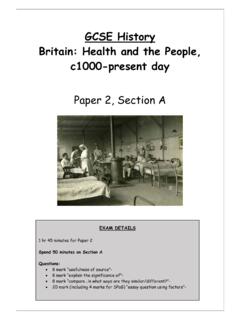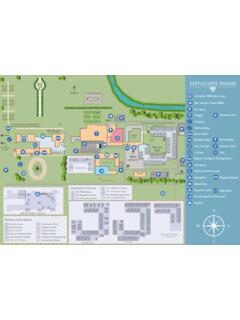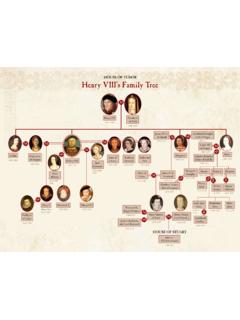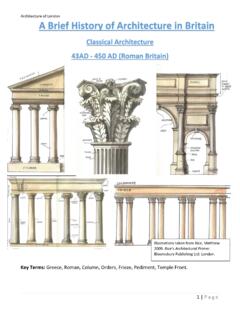Transcription of GCSE History Elizabethan England, 1568-1603
1 GCSE History Elizabethan England, 1568-1603 . Paper 2, Section B. EXAM DETAILS: 1 hr 45 minutes for Paper 1. Spend 50 minutes on Section B. Questions: 8 mark how far do you agree with this statement? . 8 mark explain . 8 mark write an account . 16 mark- Essay Q linked to a specific site/ historic environment (4. marks for SPaG). Topic 1: Elizabeth and her government Elizabeth's background and character tudor Dynasty In 1485, a civil war called the War of the Roses came to an end with the defeat of Richard III to henry tudor at the Battle of Bosworth This war had raged for over 30 years and split England apart henry tudor was crowned King henry VII and he married Richard's niece, Elizabeth of York to cement control of the country henry 's Great Matter henry VII was followed by his son, henry VIII.
2 He married Catherine of Aragon but in 20 years only produced a daughter, Mary henry believed he was being punished by God AND had become obsessed with a lady at court called Anne Boleyn, who became his mistress He wanted a divorce, but years and years of diplomatic pressure and bullying failed and the Pope refused his request When Anne fell pregnant, henry broke from Rome and made himself Head of the English Church It was vital that he married Anne before the birth of the child because so the child would be a legitimate heir to the throne Much to henry 's anger, another girl was born called Elizabeth on 7 September 1533 at the Palace of Greenwich An Act of Succession was passed which confirmed the new child as the heir to the throne, which also declared Mary (his eldest child)
3 Illegitimate Elizabeth's early life Early 1540s - Exiled from court, Elizabeth rarely saw her father She was taught by governess Kat Ashley and later Roger Ascham. She was taught to use the modern italic style of handwriting, developed in Italy during the Renaissance By 14, Elizabeth could speak French, Italian, Spanish and Latin fluently and was able to read Greek She was not just intellectual, but athletic- being an accomplished horsewoman and dancer 1544 - HVIII 6th wife, Protestant reformer, Catherin Parr, influenced Elizabeth's Protestant religion A Third Act of Succession restored Elizabeth as an heir to the throne.
4 But stated she could only succeed after her brother Edward and Mary Jan 1547 - HVIII dies and is succeeded by 9yr old son Edward 1549 - Thomas Seymour, now married to Catherine Parr, began a flirtation with Elizabeth. Seymour was accused of treason and executed. Elizabeth was question on the ground that Seymour was plotting to overthrow Edward and marry Seymour. Elizabeth escaped, but learned not to trust anyone Summer 1553 - Edward VI dies and following the failure of Lady Jane Grey, Mary is proclaimed Queen 1554 - Mary's marriage to Phillip of Spain provokes the Wyatt rebellion.
5 - Elizabeth was suspected of working with the rebels and was imprisoned in the Tower of London - imprisoned for 2 months and then released and placed on house arrest Nov 1558 - Mary dies Jan 1559 - Elizabeth's coronation ceremony Elizabethan Politics The Royal Court Run by the Lord Chamberlain, the Court was located wherever the Queen was It consisted of the Queen's household, made up of 500 nobles, advisors, officials, and servants and They were called courtiers Access to the queen was crucial to an politician Court=centre of political power Progresses Elizabeth would travel with her Court on tours called progresses, visiting the homes of nobility Her journey covered the South East, Midlands and East Anglia It allowed Elizabeth to be seen by her subjects regularly, to build relations with her people and to flatter the nobles she stayed with Progresses allowed Elizabeth to live in luxury at the expense of her subjects.
6 As the nobility worker hard to impress her The journeys also removed the Court from the capital at times when plague was rife allowing the Royal palaces to be fumigated Performance The Court had a number of function: social hub; entertainment; and the political centre Subtle propaganda, glorifying the Queen's image Patronage Patronage involved the favouritism of individuals, by giving men important jobs It caused intense competition and rivalries between people This made everyone loyal to Elizabeth It also ensured Elizabeth remained at the heart of whole political system Privy Council The PC co-ordinated the financial departments Members were generally from the nobility, gentry and the church Elizabeth could choose and dismiss members of her PC.
7 PC met more often during Elizabeth's reign They would advise and direct policy to her, but she was not obliged to take their advice PC could issue proclamations and command arrest and imprisonment Elizabeth's PC. After Elizabeth became Queen, Mary's Catholic Council could act as a barrier to re- establishing Protestantism. Elizabeth's first Privy Council had 19 members (far more manageable and efficient than Mary's 40-member Council). Half were drawn from Mary's Council to maintain experience and avoid alienating important individuals. The other half were brand new, allowing Elizabeth to reward loyal followers and to promote men of ability.
8 She was careful not to appoint any strong Catholics. Over time the nobility were gradually moved out and by the second half of her reign the PC was a small, highly efficient group of educated, professional, full-time politicians, largely from the gentry. William Cecil/ Lord Burghley The most important appointment Elizabeth made was one of her first William Cecil. Elizabeth came to rely heavily on him. Their successful working relationship lasted until his death 40 years later. He was in continual contact with the Queen. All her correspondence passed through him.
9 Cecil was loyal, but also knew how to manage the Queen. He threatened to resign to make her co-operate and carefully used Parliament to manipulate the Queen into taking the position he wanted. Elizabeth respected him for speaking his mind, but knew that he would carry out her wishes even if he personally disagreed. He also helped the Queen to manage the political patronage system and had his own patronage secretary Sir Michael Hickes . who was responsible for dealing with the requests people made for various positions. Cecil had a difficult relationship with another key member of the Privy Council the more radical and PURITAN Robert Dudley, a favourite of Elizabeth.
10 Divide and Rule Elizabeth knew how to control the PC- often showing affection and rewarding them Elizabeth deliberately appointed men who were hostile towards each other- by forcing rival factions to work together, led to men competing each other for her affection- divide and rule They would give contrasting advice, which would then allow her to make a measured decision The Role of Parliament The monarch decided when Parliament was called and for how long. The Monarch needed Parliament's permission for any new laws or taxes and in return the Monarch would listen to Parliament's concerns.








